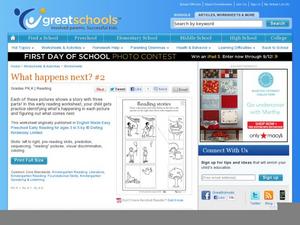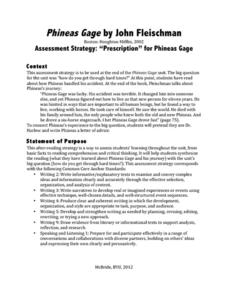Curated OER
Doyle Online Writing Lab: Paper Editing Worksheet
Both the writer and the reviewer contribute to this editing activity. Before handing the paper to a partner, the writer lists specific areas of concern for the reader to address. The editor addresses these concerns and offers detailed...
Curated OER
Antonyms
Explore some higher-level antonyms with your high schoolers. There are 10 main words listed and five antonyms to select from for each. Example vocabulary words include demolish, ceremonious, and biased.
Curated OER
Sentence Completion 5: High-intermediate Level
How do you figure out what word best completes a sentence? The answers and explanations key that accompanies an eight sentence exercise outlines the strategies used to determine the correct response for assessments of this type....
Curated OER
Idioms
Use this podcast instructional activity to familiarize scholars with the characteristics, history, and cultural implications of idioms. As part of the Walking Classroom curriculum, kids listen to a 12-minute podcast as they walk around...
Curated OER
The Little Red Hen: Lesson
After hearing the classic version of The Little Red Hen, pre-schoolers use the sequence of events and ordinal position words to construct a version of their own. They use stick puppets to retell the story, with updated modifications that...
Curated OER
Reading a Calendar
Calendars are great for so many reasons. They keep track of time, can help teach children to read charts, show numbers in sequential order, and are perfect for word problems. First graders assess three different calendars to answer 11...
Curated OER
Reading Practice: Boris the Brainiest Baby
Boris is the smartest baby around! Beginning readers can use this short story excerpt to practice reading comprehension and fiction elements. They read the story and then discuss what they think he will do next. Scholars create an...
Curated OER
What Happens Next: 2
What happens next? That is a great question that requires learners to think about the sequence of events then make a prediction. They assess the pictures on the left and draw lines to the pictures on the right that show what will happen...
Curated OER
Report Writing
Why don't dinosaurs wander the earth any longer? Answer this fascinating question with young readers as they examine a brief informational text. There are bolded words to separate text sections which are an excellent example of...
Curated OER
Its or It's
What's the difference between its and it's? Clear up any misunderstandings in your third grade language arts class. Practice sentences use its or it's twice, prompting learners to use context clues for each usage. At the end of the...
Curated OER
Identifying Career Interests in the Volunteer and Government Sectors
Here is a great way to give your class a real-life job experience, while also serving the community. They explore a variety of volunteer opportunities to build career interests, gain work experience, and help their community grow. This...
Curated OER
Describe and Compare: Teacher Edition
Note: This is the teacher's guide to Pimsleur's French lesson called "Describe & Compare." The guide discusses the lesson's purpose, objectives, and designed learning outcomes. It presents information on each of the activities the...
Southern Nevada Regional Professional Development Program
“Double Double Speak Speak”
Bilateral suborbital hematoma? Call an audible? 404? Have fun with “the twittering or warbling of birds,” or as 14th century French speakers would say, have fun with “jargon.” Groups match specialized jargon with plain speech, decode...
Southern Nevada Regional Professional Development Program
Was Bias A Factor? Make an Argument
The ability to analyze an argument is a skill emphasized by the Common Core standards. Offer your class an opportunity to develop and hone their skills by providing them the testimonies in an Oregon court case. After reading the facts of...
Southern Nevada Regional Professional Development Program
Vocabulary Activity
Talk about a menu! Who would have thought SAT prep could be so delicious? Treat your class to a full course of SAT words with a timed activity that asks groups to create clues for dishes on their bill of fare. Distained veggies anyone?...
Curated OER
Finders Keepers: Vocabulary Instructional Routine Guide for Extremely Loud and Incredibly Close
Like Oskar, the curious boy in Jonathan Safran Foer’s story, class members journey through other “stories that the mouth can’t tell” to find another sentence that uses a word found in novel. Individuals create their own vocabulary list,...
Brigham Young University
HOOT Directed Reading Thinking Activity
It's helpful to encourage kids to make predictions when beginning a reading unit. Before reading Hoot by Carl Hiaasen, have kids read Susan Barlow Broggi's Am I Grown Up When I'm Not Afraid of Spiders in My Shoes? to make predictions...
Curated OER
Color Scheme Acrylic Painting Self-Assessment
Being a good artist means being able to critique your own work. Here young painters will take a short quiz on color schemes in acrylic painting and then reflect on their use of color in a recently completed piece. A great learning...
Curated OER
Maus: Making a Visual Representation
How do you represent a tragic event? Are stories of tragic events better left untold? After reading chapter two of Maus and studying other representations of the Holocaust (suggestions are included), class members create a representation...
Curated OER
Parrot in the Oven: Letter to a Character
Readers of Parrot in the Oven: Mi Vida place themselves in the story and craft a persuasive letter to a character in Victor Martinez's National Book Award-winning novel.
Curated OER
Phineas Gage: Assessment Strategy
Close up your study of Phineas Gage: A Gruesome but True Story About Brain Science with a letter-writing assignment. Pupils prepare by journaling and sharing with a partner. They then compose letters that focus on a big idea from the...
Curated OER
Phineas Gage: Notecard Vocabulary Strategy
Understanding the vocabulary in a text, especially a text like Phineas Gage: A Gruesome but True Story About Brain Science that includes quite a few technical terms, can be the key to understanding the text as a whole. Learners focus on...
Curated OER
The Little Prince: Socratic Questioning Strategy
Challenge readers to read closer in an activity based on the Socratic questioning strategy. As kids read Antoine de Saint Éxupery's The Little Prince, they use sentence starters to ask deeper questions about the text, and to relate what...
Curated OER
How Balanced Are You?
Young learners take a look at what they eat in one day and compare it to how much physical activity they do on that same day. Point out that this is only a one-day glimpse at balancing the energy going in and what energy being used. They...
Other popular searches
- Making Accurate Measurements
- Accurate Data Collection
- Accurate Directions
- Accurate Restatement
- Accurate Measurements
- Accurate Sample Size
- Accurate Word Identification
- Accurate Proportion
- Accurate Record Keeping
- Accurate Point Interpolation
- More Accurate
- Accurate Measurements Candy

























